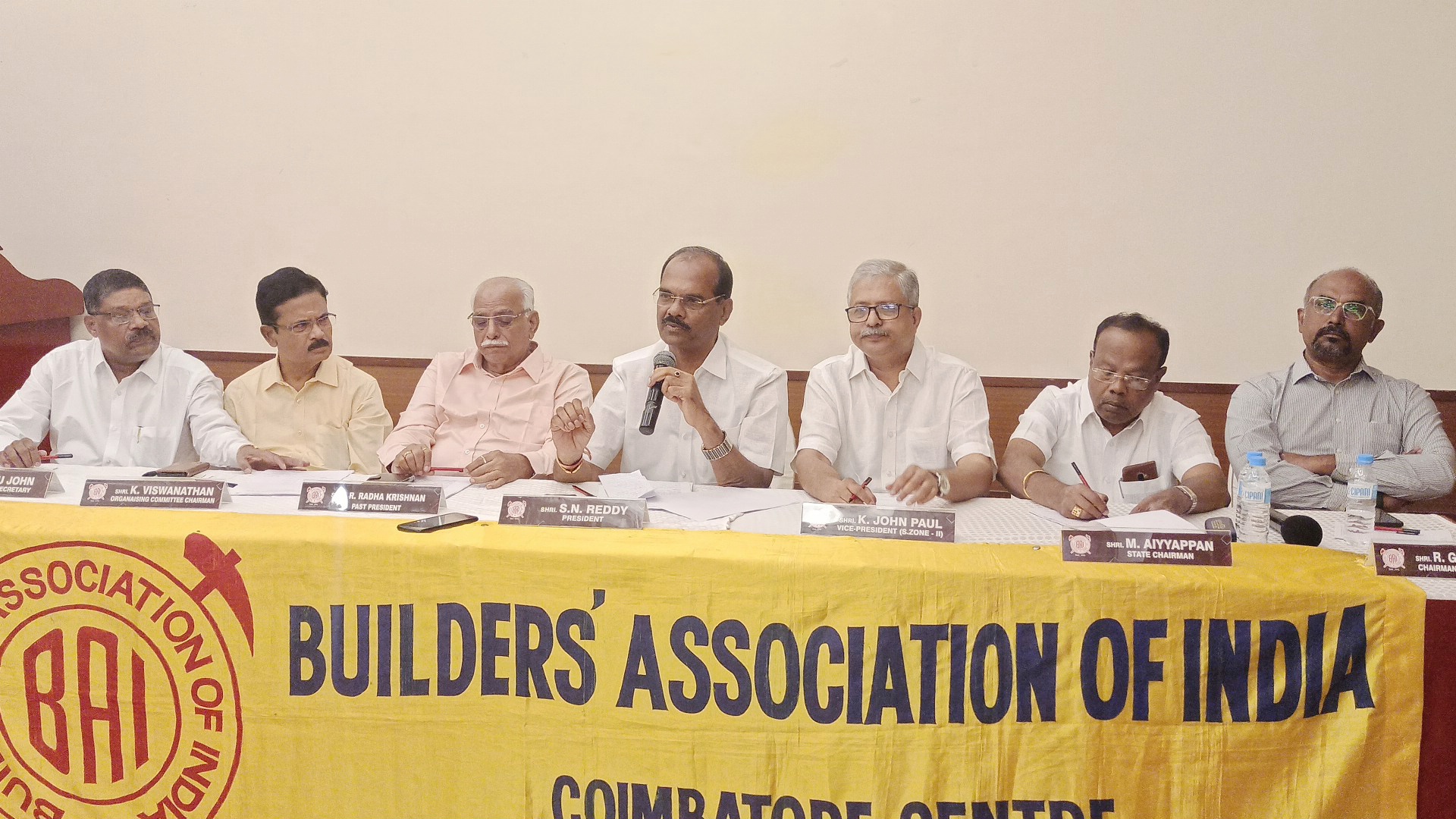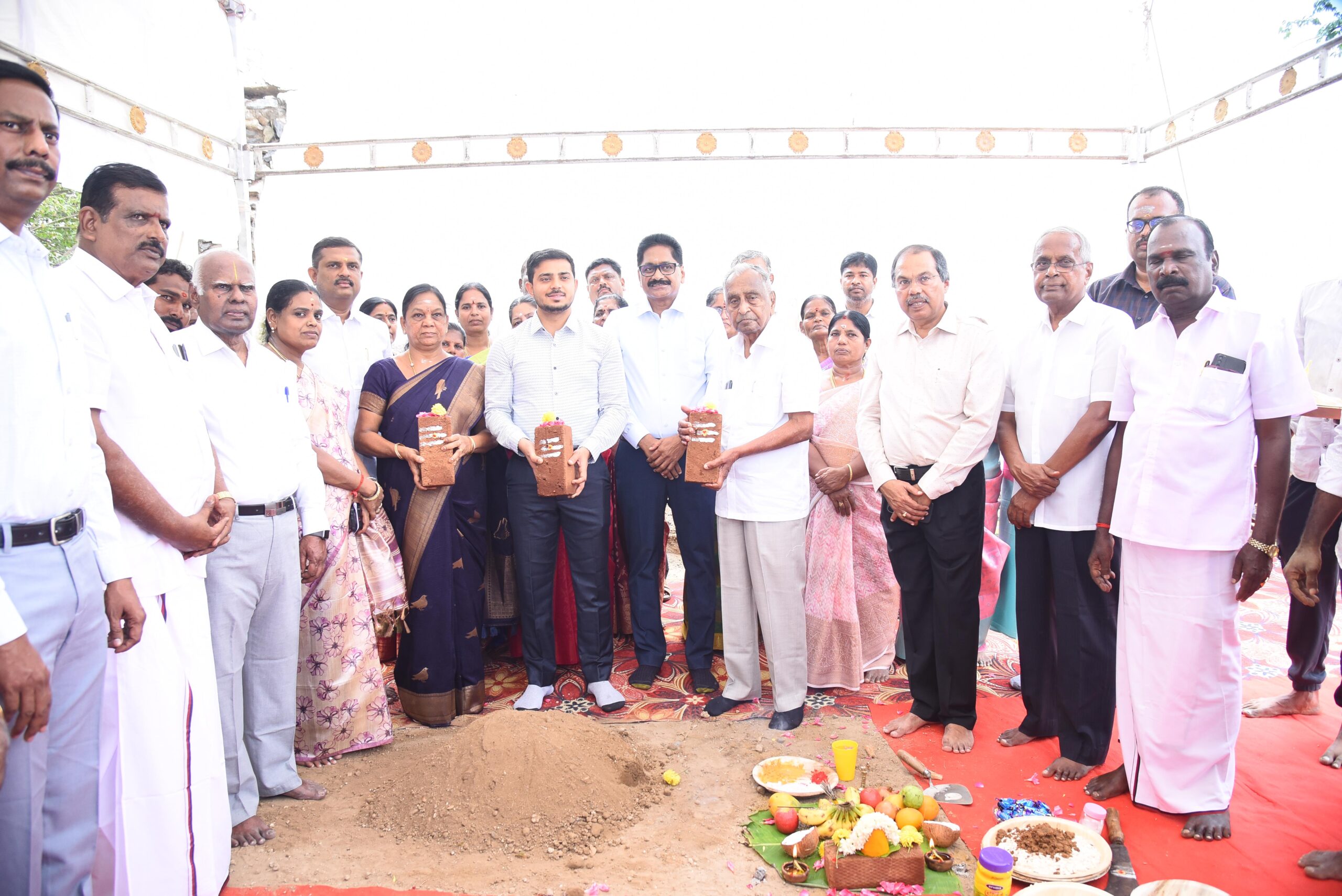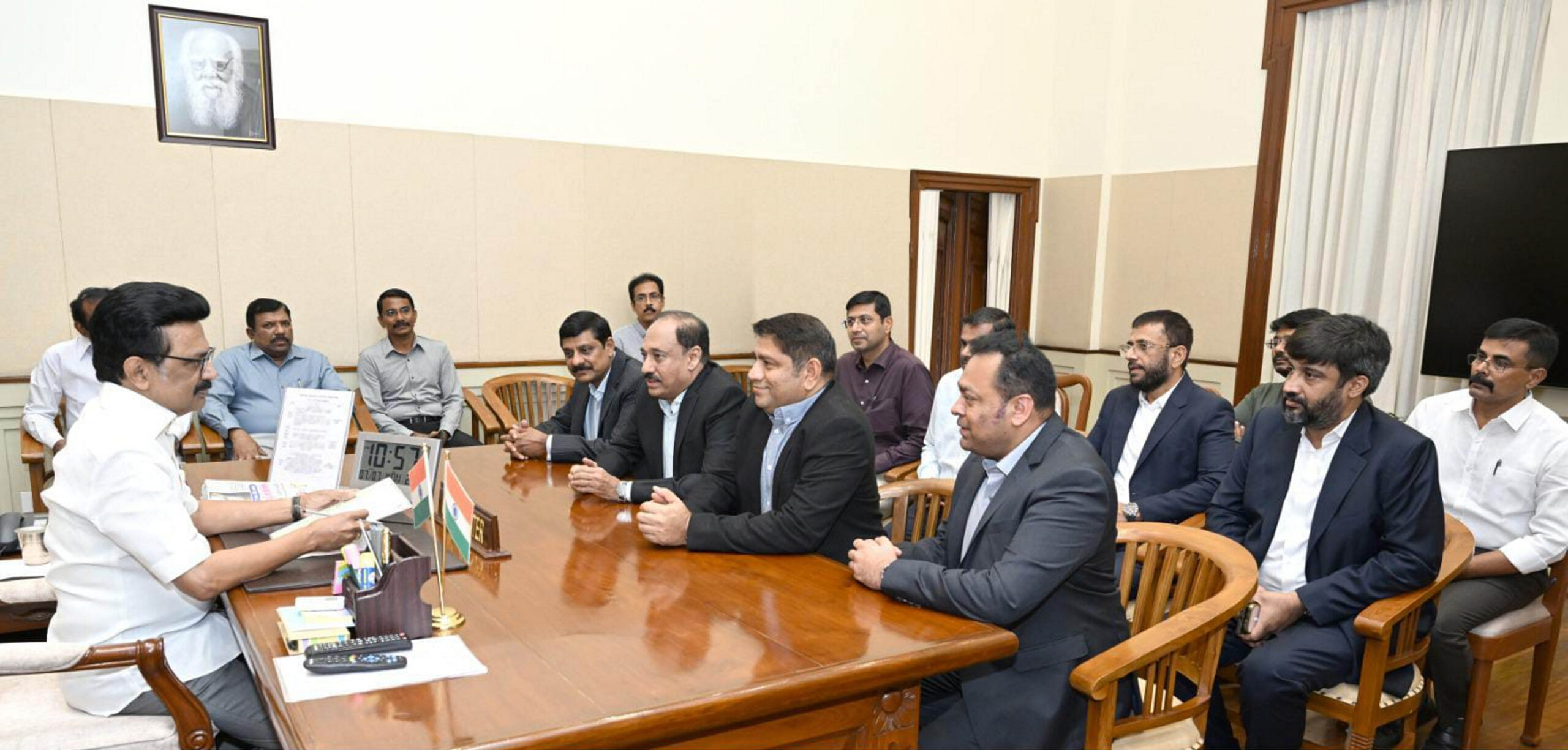Trending Now
- “I will soon make an announcement regarding a statewide tour across Tamil Nadu.” – O. Panneerselvam.
- Vatsala, Asia’s oldest elephant, has passed away at Panna Tiger Reserve; social activists mourn the death of this elephant, which lived for over 100 years.
- “The U.S. Govt earned ₹8 lakh crore this year through increased tariffs on foreign goods.” – U.S President Donald Trump.
- World No.1 Aryna Sabalenka has advanced to the semifinals in the Women’s Singles category at Wimbledon Tennis.
Coimbatore
BUILDERS ASSOCIATION OF INDIA (BAI)
![]() May 12, 2023
May 12, 2023
Builders’ Association of India (BAI) is an apex all India body of Engineering Construction Contractors and Real Estate Companies founded in 1941, with more than 20,000 business entities as members through its 200 plus Centres (Branches) throughout the country. Regional Associations Affiliated to BAI form indirect membership of more than 1,00,000. The fundamental aim of the Association is to bring about all round improvements in the construction sector, while striving towards resolution of operational as well as policy level problems faced by the construction industry. This involves making efforts to obtain from policy makers and authorities, the level of attention that the construction industry deserves in view of its tremendous contribution and importance to the economy.
1. Single window clearance / Environment and Forest clearance.
Several infrastructure projects of various National Highways, State Highways, Power projects and Industrial corridor of more than Rs.15.00 Lakh Crore are pending because of non clearance from the Environmental Ministry or Ministry of Forest. The requirement of clearance from Environmental & Forest Ministries at multiple layers creates abnormal delay in completing the projects and increases cost abnormally.
Hence there an urgent need for a single window clearance system by putting all authorities at one place to give relief for various developers and consumers and prevent escalation of project costs.,
2. Issues relating to the Land Acquisition.
Government of India has a gigantic plan of investing more than Rs.120.00 Lakh Crore for development of physical infrastructure like smart cities, various new Townships like Industrial Corridor, Power projects, Dams, Bridges, Airport, Seaport, etc. for the development of the country. But in the present scenario, land acquisition is a serious issue delaying the projects abnormally. Government of India should take full responsibility of land acquisition and avail the same for Contractors before awarding the contracts. Contractors should not be required to deal directly with the land owners affected by the projects.
3. Prevent Cartellisation by Cement Manufacturers
Cement constitutes a major cost factor in any construction. However, the Cement Manufacturers throughout the country indulge in unfair trade practice with a view to profiteering. Recently, in a Petition filed by BAI, the Hon’ble Competition Commission of India imposed a penalty of Rs.6,307.38 Crores against 11 Cement Manufacturers in the month of June 2012 for their cartel like arrangement in controlling the production and dispatch of Cement. The Cement Manufacturers were subsequently forced to deposit 10% of the penalty with the Appellate Tribunal of Competition Commission of India.
It is high time the Government of India should seriously consider complying with the recommendation of the Parliamentary Standing Committee for appointment of a ‘Cement Regulatory Authority’ similar to the Regulatory Authorities constituted by the Government of India to regulate various Core Sectors of Economy like SEBI, TRAI, RERA etc.
Exempt Cement from Customs Duty BAI also urges to the Government to exempt Cement Import from Customs Duty. At present it has a 12.50% Countervailing Duty, Rs.125/- per tone as Special Duty, Special Additional Duty of 4% of CVD and 3% Educational Cess. If duty free import is allowed by the Government, it will act as a check on Cement Manufacturers from price manipulation.
The Cement price as of today is above Rs.350/- per 50 Kg. bag. If the same is sold at reasonable rate i.e. Rs.175/- to Rs.200/- per 50 Kg. bag, the price of purchasing of a flat or construction of a house will drastically come down, even to the extent of Rs.50/- per Sq.ft.
4. Unfair Contract Conditions.
Several years after independence, India is still unfortunately following the ‘Contract Act 1892’ which is the relics of British Raj. Hence, we contractors have to still get freedom from the draconian Contract Act.
The Contract conditions followed by many Government Authorities have – One sided conditions with no accountability on the part of Officers. There is no proper Price Escalation Formula. Similarly there is no Dispute Resolution Mechanism or Arbitration clause.
NHAI Contractors were awarded more than Rs.1 lakh Crores in their favour which is disputed by the Government at various High Courts or Supreme Court. India should have contract conditions in line with FIDIC Contract Conditions. (World Bank aided project).
5. Availing Labour Welfare Cess collected for Skill Upgradation of Construction Workers.
Construction Industry expects to employ 80 million workers in the year 2023. The productivity of Indian construction workers are the lowest. If we compare the productivity of an American Worker as 100 the Indian workers productivity is only 8. If we can even double the present productivity, the industry and the nation will benefit abundantly. BAI in association with various Government as well as private bodies have taken up training of construction workers as one of its main object.
Government having rightly understood the importance of skill development, formed National Skill Development Corporation (NSDC) under the aegies of Prime Minister’s Office. Which has constituted Industry-wise Skill Councils.
For Construction Industry also we have formed Construction Skill Development Council of India (CSDCI), and Builders’ Association of India is one of the Promoters. In order to train the construction workers, huge fund is required. The Government have collected more than Rs. 87,478 crore, from the contractors towards ‘Labour Welfare Cess’, and a minimum of 20% of this amount should be available for skilling the construction workers also. We also request the Government to make available ‘Corporate Social Responsibility’ (CSR) amount for skilling the construction workers.
6. Completion Certificate issue
As per “Tamil Nadu Combined Development and Building Rule 2019” (TNCDBR 2019), it is mandatory to get “Completion Certificate” from LPA for getting electrical connection, water supply etc. Normally LPA will issue CC if the construction is done 100% as per approved building plan.
It is a welcome measure and all un-approved constructions, un-authorized additional constructions and deviation are restricted by this system.
This can be implemented with certain minor exemption limit without violating the following major points.
1. Parking requirements
2. Side & Front offsets
3. Allowable FSI.
4. Building height.
Once if all the above four major norms are adhered to, and if there is some internal minor changes like internal partition, Door and Window location, smaller cut out coverings apart from norms mentioned in Annexure XXII of TNCDBR 2019 are to be EXEMPTED for issuing Completion Certificate by LPA.
7. Electricity Connection for the buildings of height between 15m to 18.3m
Prior to Tamil Nadu Combined Development and Building Rules, 2019 (TNCDBR 2019) The Buildings are classified as Multitiered buildings and Special buildings based on its height.
The buildings of height above 15meters (50 feet) were classified as Multistoried Building (MSB) and the height less than that are classified as Special buildings (Non MSB).
After introduction of TNCDBR 2019, the buildings of height above 18.3 meters (60 Feet) only considered as Highrise Building (MSB). And the Local Planning Authorities ( LPA ) are approving the buildings upto 18.3 metres as Non High Rise Building and give Plan Sanction.But the buildings constructed recently above 50 Feet and up to 60 Feet height (15m to18.3 m) are facing problem in getting electric power. Tamil Nadu Generation and Distribution Corporation Ltd (TANGEDCO) claims it as a High rise building and electric connection is denied and asked to follow the Highrise Building Norms (MSB).
Also, Tamilnadu Electricity Regulatory Commission (TNERC) is not accepting, stating that they are following National Building Code norms as directed by Chief Electrical Inspector General (CEIG). CEIG is an independent authority under Central Government.
Now we request the Energy Authority to consider the building law as in TNCBDR 2019, and to amend the maximum height for Non-High-Rise building as 60 feet and TNERC / CEIG has to give suitable clearance to TANGEDCO.
We also request the National BAI to look into this matter and do the needful at central level and try to modify the National Building Code in accordance with TNCDBR 2019.
8. Relaxation of Banking Norms.
Construction companies were doing cash and carry contracts for a long time with Government as their only clients and there was very healthy banking relations between the Bank and Contractor.
Gradually, Contractors evolved as entrepreneurs by executing mega projects under BOT, BOLT and PPP models. Under these models of contracting, the Contractors’ have to bring machinery, money and manpower to finish the projects and collect toll in return of their investment. Banks were willing to lend loans for these models of projects also.
Due to various political and local unrest recently many a time the project could not completed as expected. This has resulted in many banks seizing the assets mortgaged with them and also degrading the establishment to ‘D’ category making it difficult for the Contractor acquiring further loan. Definition of NPA Account of Infrastructure and Real estate company is concerned has to be redefined to suit the peculiar nature of the industry.
BAI even approached the Hon’ble Reserve Bank of India Governor and Hon’ble Finance Secretary, Ministry of Finance, with our request of restructuring the finance provided to the Construction Companies. Meanwhile recent announcement of Government allowing free FDI to construction industry should be implemented immediately for better finance arrangement for all infrastructure and housing industries in the country.
9. INCLUSION OF PETROL, DIESEL, ETC., UNDER GST REGIME
Our construction industry is facing various struggles during and after this Covid-19 pandemic. Short supply of materials, abnormal fluctuated increase in prices, movement of migrant labours, non availability of skilled labour, belated payment by contractees (including Government departments) are playing significant delay in executing works.
Compared to other industries our industries are time bound and completion of work in time is foremost criteria. Our members are struggling to complete the work in time and also running short of working capital.
Our one of the major expenses are relating to purchase of petrol, diesel, etc., for maintenance of vehicles and machinery. Non inclusion of these products under GST REGIME is affecting our industry to extend of value added tax paid. For payment of VAT on these products we are unable to get input tax credit.























